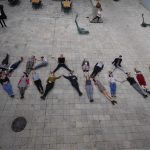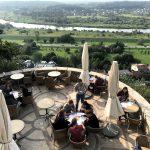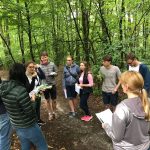Dr. Czimczik is a Studienstiftung alumni (www.studienstiftung.de). Stipendiaten koennen mich gerne mit Fragen zum Praktikum, Studium oder Karriere in den USA kontaktieren.
Dr. Czimczik and Dr. Eric Klein (University of Alaska, Anchorage)  contributed to the 2018 Sommerakademie in Krakow, Poland. This short course was open to fellows of the Studienstiftung and the DAAD (Deutscher Akademischer Austauschdienst). The Czimczik/Klein working group introduced students from a wide range of fields, with a basic understanding of and interest in the natural sciences (i.e. chemistry, biology) and data analysis, to the power of isotopes.
contributed to the 2018 Sommerakademie in Krakow, Poland. This short course was open to fellows of the Studienstiftung and the DAAD (Deutscher Akademischer Austauschdienst). The Czimczik/Klein working group introduced students from a wide range of fields, with a basic understanding of and interest in the natural sciences (i.e. chemistry, biology) and data analysis, to the power of isotopes.
Working Group 2: Isotope Forensics
Do you enjoy watching TV shows like CSI or Bones, or animal  documentaries? Did you ever wonder what was really in your lunch, whether you should have trusted that reputable art dealer at the bazaar, or how we know that fossil carbon emissions cause global warming? Find out how the distribution and abundance of rare isotopes can answer many different questions!
documentaries? Did you ever wonder what was really in your lunch, whether you should have trusted that reputable art dealer at the bazaar, or how we know that fossil carbon emissions cause global warming? Find out how the distribution and abundance of rare isotopes can answer many different questions!
Together, we will explore the origin and biogeochemical cycles of carbon, nitrogen, sulfur, and water in the Earth System.  We will investigate how stable rare isotopes (the heavier siblings of regular carbon, nitrogen, sulfur, and oxygen) can tell us about the geographic origin of body parts, the food sources and migration patterns of animals, the purity and authenticity of our food and drugs, and the distribution of sea ice. And, we will examine how the discovery of radiocarbon analysis and the nuclear bomb tests of the 1950s and 1960s revolutionized many scientific fields. We will investigate how we can know the real age of artifacts (except pirate booty), track the fate of fossil fuel emissions to the atmosphere, and finally measure the age of trees in the Amazon.
We will investigate how stable rare isotopes (the heavier siblings of regular carbon, nitrogen, sulfur, and oxygen) can tell us about the geographic origin of body parts, the food sources and migration patterns of animals, the purity and authenticity of our food and drugs, and the distribution of sea ice. And, we will examine how the discovery of radiocarbon analysis and the nuclear bomb tests of the 1950s and 1960s revolutionized many scientific fields. We will investigate how we can know the real age of artifacts (except pirate booty), track the fate of fossil fuel emissions to the atmosphere, and finally measure the age of trees in the Amazon.
Using hands-on activities, we will discover how scientists collect  environmental samples and analyze isotope datasets. We will discuss how scientists measure isotopes and how they know whether their (expensive) isotope data is meaningful. We hope you will take away a working knowledge of environmental forensics that you may use in your careers.
environmental samples and analyze isotope datasets. We will discuss how scientists measure isotopes and how they know whether their (expensive) isotope data is meaningful. We hope you will take away a working knowledge of environmental forensics that you may use in your careers.